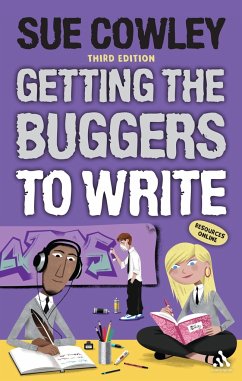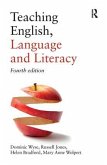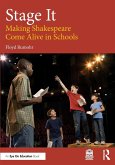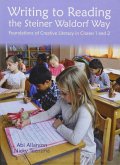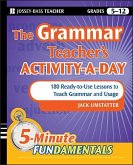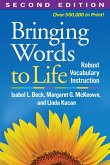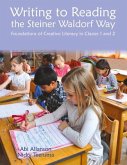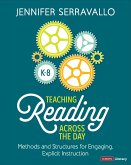Sue Cowley
Getting the Buggers to Write
Sue Cowley
Getting the Buggers to Write
- Broschiertes Buch
- Merkliste
- Auf die Merkliste
- Bewerten Bewerten
- Teilen
- Produkt teilen
- Produkterinnerung
- Produkterinnerung
A practical guide for teachers, offering a host of ways to help all their students to improve their writing skills. It also offers advice on improving skills and confidence, and getting students excited about writing - not just in literacy or English, but across the curriculum.
Andere Kunden interessierten sich auch für
![Teaching English, Language and Literacy Teaching English, Language and Literacy]() Dominic Wyse (Institute of Education, University College London, UKTeaching English, Language and Literacy40,99 €
Dominic Wyse (Institute of Education, University College London, UKTeaching English, Language and Literacy40,99 €![Stage It Stage It]() Floyd RumohrStage It42,99 €
Floyd RumohrStage It42,99 €![Writing to Reading the Steiner Waldorf Way Writing to Reading the Steiner Waldorf Way]() Abi AllansonWriting to Reading the Steiner Waldorf Way40,99 €
Abi AllansonWriting to Reading the Steiner Waldorf Way40,99 €![The Grammar Teacher's Activity-A-Day: 180 Ready-To-Use Lessons to Teach Grammar and Usage The Grammar Teacher's Activity-A-Day: 180 Ready-To-Use Lessons to Teach Grammar and Usage]() Jack Umstatter ( Cold Spring Harbor School District in Long IslandThe Grammar Teacher's Activity-A-Day: 180 Ready-To-Use Lessons to Teach Grammar and Usage25,99 €
Jack Umstatter ( Cold Spring Harbor School District in Long IslandThe Grammar Teacher's Activity-A-Day: 180 Ready-To-Use Lessons to Teach Grammar and Usage25,99 €![Bringing Words to Life Bringing Words to Life]() Isabel L. BeckBringing Words to Life45,99 €
Isabel L. BeckBringing Words to Life45,99 €![Writing to Reading the Steiner Waldorf Way Writing to Reading the Steiner Waldorf Way]() Abi AllansonWriting to Reading the Steiner Waldorf Way32,99 €
Abi AllansonWriting to Reading the Steiner Waldorf Way32,99 €![Teaching Reading Across the Day, Grades K-8 Teaching Reading Across the Day, Grades K-8]() Jennifer SerravalloTeaching Reading Across the Day, Grades K-838,99 €
Jennifer SerravalloTeaching Reading Across the Day, Grades K-838,99 €-
-
-
A practical guide for teachers, offering a host of ways to help all their students to improve their writing skills. It also offers advice on improving skills and confidence, and getting students excited about writing - not just in literacy or English, but across the curriculum.
Hinweis: Dieser Artikel kann nur an eine deutsche Lieferadresse ausgeliefert werden.
Hinweis: Dieser Artikel kann nur an eine deutsche Lieferadresse ausgeliefert werden.
Produktdetails
- Produktdetails
- Getting the Buggers
- Verlag: Continuum Publishing Corporation
- 3 ed
- Seitenzahl: 264
- Erscheinungstermin: 15. Dezember 2011
- Englisch
- Abmessung: 216mm x 141mm x 17mm
- Gewicht: 338g
- ISBN-13: 9781441171306
- ISBN-10: 1441171304
- Artikelnr.: 33146600
- Herstellerkennzeichnung
- Produktsicherheitsverantwortliche/r
- Europaallee 1
- 36244 Bad Hersfeld
- gpsr@libri.de
- Getting the Buggers
- Verlag: Continuum Publishing Corporation
- 3 ed
- Seitenzahl: 264
- Erscheinungstermin: 15. Dezember 2011
- Englisch
- Abmessung: 216mm x 141mm x 17mm
- Gewicht: 338g
- ISBN-13: 9781441171306
- ISBN-10: 1441171304
- Artikelnr.: 33146600
- Herstellerkennzeichnung
- Produktsicherheitsverantwortliche/r
- Europaallee 1
- 36244 Bad Hersfeld
- gpsr@libri.de
Sue Cowley
Author's note, Third Edition \ Acknowledgements \ Introduction \ Part 1:
Starting Points \ 1. First Steps to Writing \ The Strands of Literacy \
Early Mark Making \ Early Writing Techniques \ Letter Activities \ From
Letters to Words \ From Words to Sentences \ Structure and Young Writers \
What Makes a Good Writer? \ 2. Building Firm Foundations \ Back to Basics \
Spelling \ Punctuation \ Grammar \ Some Thoughts on Paragraphing \
Handwriting \ Graphology \ Working with Words \ 3. The Writer's Toolkit \
Writing Processes \ Finding a Starting Point \ Selecting a Form \ Knowing
your Audience \ Thinking about Viewpoint, Style and Timing\ Brainstorming \
Researching \ Mind-mapping \ Selecting material \ Planning \ From First
Draft to Final Draft \ Presenting the Final Draft \ Reviewing and
Evaluating \ 4. The Motivated Writer \ Getting them Writing \ Keeping them
Writing \ Getting them Writing Properly \ A Reason to Write \ An Atmosphere
for Writing \ Warm-up Exercises \ Focus Exercises \ Putting the Pleasure
Back into Writing \ The Teacher as Writer \ Part 2: Write Across the
Curriculum \ 5. Writing in All the Subjects \Writing in Practical Subjects
\ Motivation Across the Curriculum \ All Together Now: Cross Curricular
Writing \ 6. Essay Writing \ Some Basic Tips \ Planning an Essay \
Answering the Question \ How to Quote \ The 'Four Step' Essay-Writing
Technique \ Introductions and Conclusions \ 7. Creative Writing \ Creating
a Fiction \ Starting Points for Creative Writing \ Finding Inspiration \
Using your Senses \ The Importance of Genre \ Writing Fiction \ Writing
Scripts \ Writing Poetry \ 8. Non-fiction Writing \ Note-taking and
Annotation \ Building your Writing \ Non-fiction Forms \ Technique and
Non-fiction Writing \ Types of Non-fiction Writing \ Recount (account) \
Report (non-chronological) \ Explanation \ Instructions (procedure) \
Persuasive Writing \ Discussion \ The Importance of Being an Expert \
Writing about Language \ Writing about Literature \ 9. Writing in the
Digital Age \ ICT and Writing \ Word Processing \ Writing and the
Interactive Whiteboard \ Writing and the Internet \ E-mail and Writing \
ICT: The Practicalities \ Part 3: Everyone's a Writer \ 10. Supporting the
Struggling Writer \ Key Strategies for the Teacher \ Key Strategies for the
Student \ Key Strategies for Differentiation \ Supporting Students with
ESL/EAL \ Writing and Behaviour \ 11. Extending the Gifted Writer \
Challenging Starters \ Structuring the Learning \ Finding a 'Voice' \ Essay
Writing with the Most Able \ 12. Boys and Writing \ Expectations of Boys'
Writing \ Motivating Boys to Write \ Inspirational Topics for Boys' Writing
\ Teaching Techniques to Inspire Boys \ Engaging Formats for Boys' Writing
\ Part 4: Writing it Right \ 13. Writing and Assessment \ Top Tips for
Assessment \ Marking Symbols \ Marking Methods \ Strategies for Assessment
\ Effective Questioning Techniques \ Approaching Exams \ 14. The Writing
Clinic \ Overwriting \ Dull or Under-Writing \ Lack of Punctuation \
Repetitive Writing \ Irrelevant Facts \ Listing \ 15. Celebrating Writing \
Displaying Writing \ Publishing Writing \ Book Weeks \ Author Days/Weeks \
Charity Activities \ Competitions \ Writers' Workshops \ 'Play in a Day' \
Trips \ Part 5: Resources for Writing \ Appendix 1: Text-messaging \
Appendix 2: Useful websites \ Appendix 3: Vocabulary \ Appendix 4: Marking
symbols \ Index
Starting Points \ 1. First Steps to Writing \ The Strands of Literacy \
Early Mark Making \ Early Writing Techniques \ Letter Activities \ From
Letters to Words \ From Words to Sentences \ Structure and Young Writers \
What Makes a Good Writer? \ 2. Building Firm Foundations \ Back to Basics \
Spelling \ Punctuation \ Grammar \ Some Thoughts on Paragraphing \
Handwriting \ Graphology \ Working with Words \ 3. The Writer's Toolkit \
Writing Processes \ Finding a Starting Point \ Selecting a Form \ Knowing
your Audience \ Thinking about Viewpoint, Style and Timing\ Brainstorming \
Researching \ Mind-mapping \ Selecting material \ Planning \ From First
Draft to Final Draft \ Presenting the Final Draft \ Reviewing and
Evaluating \ 4. The Motivated Writer \ Getting them Writing \ Keeping them
Writing \ Getting them Writing Properly \ A Reason to Write \ An Atmosphere
for Writing \ Warm-up Exercises \ Focus Exercises \ Putting the Pleasure
Back into Writing \ The Teacher as Writer \ Part 2: Write Across the
Curriculum \ 5. Writing in All the Subjects \Writing in Practical Subjects
\ Motivation Across the Curriculum \ All Together Now: Cross Curricular
Writing \ 6. Essay Writing \ Some Basic Tips \ Planning an Essay \
Answering the Question \ How to Quote \ The 'Four Step' Essay-Writing
Technique \ Introductions and Conclusions \ 7. Creative Writing \ Creating
a Fiction \ Starting Points for Creative Writing \ Finding Inspiration \
Using your Senses \ The Importance of Genre \ Writing Fiction \ Writing
Scripts \ Writing Poetry \ 8. Non-fiction Writing \ Note-taking and
Annotation \ Building your Writing \ Non-fiction Forms \ Technique and
Non-fiction Writing \ Types of Non-fiction Writing \ Recount (account) \
Report (non-chronological) \ Explanation \ Instructions (procedure) \
Persuasive Writing \ Discussion \ The Importance of Being an Expert \
Writing about Language \ Writing about Literature \ 9. Writing in the
Digital Age \ ICT and Writing \ Word Processing \ Writing and the
Interactive Whiteboard \ Writing and the Internet \ E-mail and Writing \
ICT: The Practicalities \ Part 3: Everyone's a Writer \ 10. Supporting the
Struggling Writer \ Key Strategies for the Teacher \ Key Strategies for the
Student \ Key Strategies for Differentiation \ Supporting Students with
ESL/EAL \ Writing and Behaviour \ 11. Extending the Gifted Writer \
Challenging Starters \ Structuring the Learning \ Finding a 'Voice' \ Essay
Writing with the Most Able \ 12. Boys and Writing \ Expectations of Boys'
Writing \ Motivating Boys to Write \ Inspirational Topics for Boys' Writing
\ Teaching Techniques to Inspire Boys \ Engaging Formats for Boys' Writing
\ Part 4: Writing it Right \ 13. Writing and Assessment \ Top Tips for
Assessment \ Marking Symbols \ Marking Methods \ Strategies for Assessment
\ Effective Questioning Techniques \ Approaching Exams \ 14. The Writing
Clinic \ Overwriting \ Dull or Under-Writing \ Lack of Punctuation \
Repetitive Writing \ Irrelevant Facts \ Listing \ 15. Celebrating Writing \
Displaying Writing \ Publishing Writing \ Book Weeks \ Author Days/Weeks \
Charity Activities \ Competitions \ Writers' Workshops \ 'Play in a Day' \
Trips \ Part 5: Resources for Writing \ Appendix 1: Text-messaging \
Appendix 2: Useful websites \ Appendix 3: Vocabulary \ Appendix 4: Marking
symbols \ Index
Author's note, Third Edition \ Acknowledgements \ Introduction \ Part 1:
Starting Points \ 1. First Steps to Writing \ The Strands of Literacy \
Early Mark Making \ Early Writing Techniques \ Letter Activities \ From
Letters to Words \ From Words to Sentences \ Structure and Young Writers \
What Makes a Good Writer? \ 2. Building Firm Foundations \ Back to Basics \
Spelling \ Punctuation \ Grammar \ Some Thoughts on Paragraphing \
Handwriting \ Graphology \ Working with Words \ 3. The Writer's Toolkit \
Writing Processes \ Finding a Starting Point \ Selecting a Form \ Knowing
your Audience \ Thinking about Viewpoint, Style and Timing\ Brainstorming \
Researching \ Mind-mapping \ Selecting material \ Planning \ From First
Draft to Final Draft \ Presenting the Final Draft \ Reviewing and
Evaluating \ 4. The Motivated Writer \ Getting them Writing \ Keeping them
Writing \ Getting them Writing Properly \ A Reason to Write \ An Atmosphere
for Writing \ Warm-up Exercises \ Focus Exercises \ Putting the Pleasure
Back into Writing \ The Teacher as Writer \ Part 2: Write Across the
Curriculum \ 5. Writing in All the Subjects \Writing in Practical Subjects
\ Motivation Across the Curriculum \ All Together Now: Cross Curricular
Writing \ 6. Essay Writing \ Some Basic Tips \ Planning an Essay \
Answering the Question \ How to Quote \ The 'Four Step' Essay-Writing
Technique \ Introductions and Conclusions \ 7. Creative Writing \ Creating
a Fiction \ Starting Points for Creative Writing \ Finding Inspiration \
Using your Senses \ The Importance of Genre \ Writing Fiction \ Writing
Scripts \ Writing Poetry \ 8. Non-fiction Writing \ Note-taking and
Annotation \ Building your Writing \ Non-fiction Forms \ Technique and
Non-fiction Writing \ Types of Non-fiction Writing \ Recount (account) \
Report (non-chronological) \ Explanation \ Instructions (procedure) \
Persuasive Writing \ Discussion \ The Importance of Being an Expert \
Writing about Language \ Writing about Literature \ 9. Writing in the
Digital Age \ ICT and Writing \ Word Processing \ Writing and the
Interactive Whiteboard \ Writing and the Internet \ E-mail and Writing \
ICT: The Practicalities \ Part 3: Everyone's a Writer \ 10. Supporting the
Struggling Writer \ Key Strategies for the Teacher \ Key Strategies for the
Student \ Key Strategies for Differentiation \ Supporting Students with
ESL/EAL \ Writing and Behaviour \ 11. Extending the Gifted Writer \
Challenging Starters \ Structuring the Learning \ Finding a 'Voice' \ Essay
Writing with the Most Able \ 12. Boys and Writing \ Expectations of Boys'
Writing \ Motivating Boys to Write \ Inspirational Topics for Boys' Writing
\ Teaching Techniques to Inspire Boys \ Engaging Formats for Boys' Writing
\ Part 4: Writing it Right \ 13. Writing and Assessment \ Top Tips for
Assessment \ Marking Symbols \ Marking Methods \ Strategies for Assessment
\ Effective Questioning Techniques \ Approaching Exams \ 14. The Writing
Clinic \ Overwriting \ Dull or Under-Writing \ Lack of Punctuation \
Repetitive Writing \ Irrelevant Facts \ Listing \ 15. Celebrating Writing \
Displaying Writing \ Publishing Writing \ Book Weeks \ Author Days/Weeks \
Charity Activities \ Competitions \ Writers' Workshops \ 'Play in a Day' \
Trips \ Part 5: Resources for Writing \ Appendix 1: Text-messaging \
Appendix 2: Useful websites \ Appendix 3: Vocabulary \ Appendix 4: Marking
symbols \ Index
Starting Points \ 1. First Steps to Writing \ The Strands of Literacy \
Early Mark Making \ Early Writing Techniques \ Letter Activities \ From
Letters to Words \ From Words to Sentences \ Structure and Young Writers \
What Makes a Good Writer? \ 2. Building Firm Foundations \ Back to Basics \
Spelling \ Punctuation \ Grammar \ Some Thoughts on Paragraphing \
Handwriting \ Graphology \ Working with Words \ 3. The Writer's Toolkit \
Writing Processes \ Finding a Starting Point \ Selecting a Form \ Knowing
your Audience \ Thinking about Viewpoint, Style and Timing\ Brainstorming \
Researching \ Mind-mapping \ Selecting material \ Planning \ From First
Draft to Final Draft \ Presenting the Final Draft \ Reviewing and
Evaluating \ 4. The Motivated Writer \ Getting them Writing \ Keeping them
Writing \ Getting them Writing Properly \ A Reason to Write \ An Atmosphere
for Writing \ Warm-up Exercises \ Focus Exercises \ Putting the Pleasure
Back into Writing \ The Teacher as Writer \ Part 2: Write Across the
Curriculum \ 5. Writing in All the Subjects \Writing in Practical Subjects
\ Motivation Across the Curriculum \ All Together Now: Cross Curricular
Writing \ 6. Essay Writing \ Some Basic Tips \ Planning an Essay \
Answering the Question \ How to Quote \ The 'Four Step' Essay-Writing
Technique \ Introductions and Conclusions \ 7. Creative Writing \ Creating
a Fiction \ Starting Points for Creative Writing \ Finding Inspiration \
Using your Senses \ The Importance of Genre \ Writing Fiction \ Writing
Scripts \ Writing Poetry \ 8. Non-fiction Writing \ Note-taking and
Annotation \ Building your Writing \ Non-fiction Forms \ Technique and
Non-fiction Writing \ Types of Non-fiction Writing \ Recount (account) \
Report (non-chronological) \ Explanation \ Instructions (procedure) \
Persuasive Writing \ Discussion \ The Importance of Being an Expert \
Writing about Language \ Writing about Literature \ 9. Writing in the
Digital Age \ ICT and Writing \ Word Processing \ Writing and the
Interactive Whiteboard \ Writing and the Internet \ E-mail and Writing \
ICT: The Practicalities \ Part 3: Everyone's a Writer \ 10. Supporting the
Struggling Writer \ Key Strategies for the Teacher \ Key Strategies for the
Student \ Key Strategies for Differentiation \ Supporting Students with
ESL/EAL \ Writing and Behaviour \ 11. Extending the Gifted Writer \
Challenging Starters \ Structuring the Learning \ Finding a 'Voice' \ Essay
Writing with the Most Able \ 12. Boys and Writing \ Expectations of Boys'
Writing \ Motivating Boys to Write \ Inspirational Topics for Boys' Writing
\ Teaching Techniques to Inspire Boys \ Engaging Formats for Boys' Writing
\ Part 4: Writing it Right \ 13. Writing and Assessment \ Top Tips for
Assessment \ Marking Symbols \ Marking Methods \ Strategies for Assessment
\ Effective Questioning Techniques \ Approaching Exams \ 14. The Writing
Clinic \ Overwriting \ Dull or Under-Writing \ Lack of Punctuation \
Repetitive Writing \ Irrelevant Facts \ Listing \ 15. Celebrating Writing \
Displaying Writing \ Publishing Writing \ Book Weeks \ Author Days/Weeks \
Charity Activities \ Competitions \ Writers' Workshops \ 'Play in a Day' \
Trips \ Part 5: Resources for Writing \ Appendix 1: Text-messaging \
Appendix 2: Useful websites \ Appendix 3: Vocabulary \ Appendix 4: Marking
symbols \ Index

